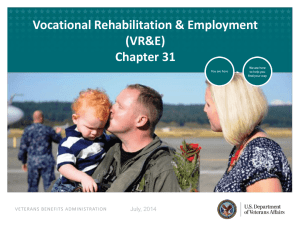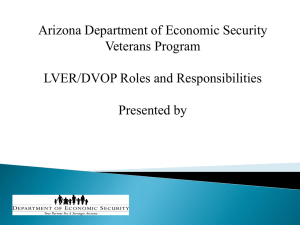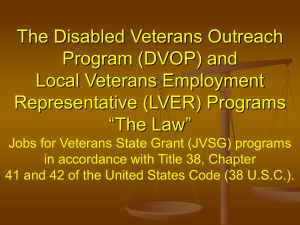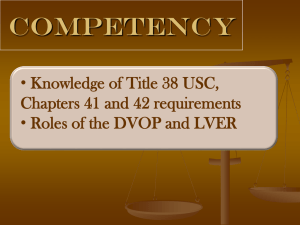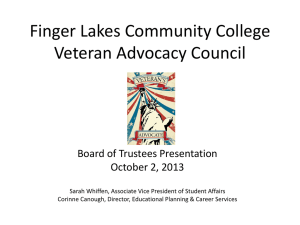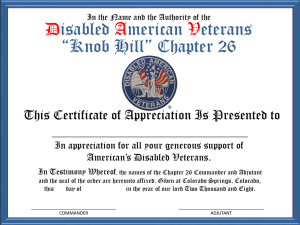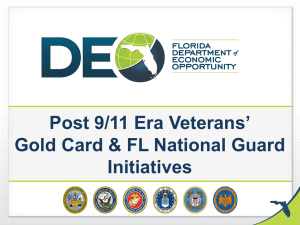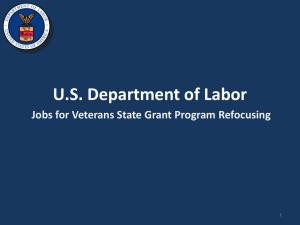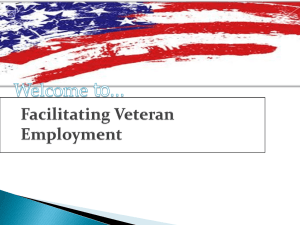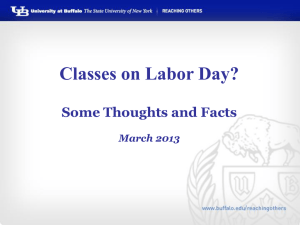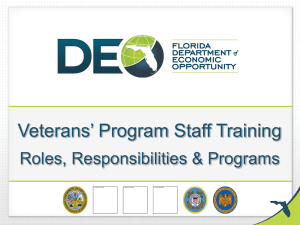LVER - National Veterans` Training Institute
advertisement
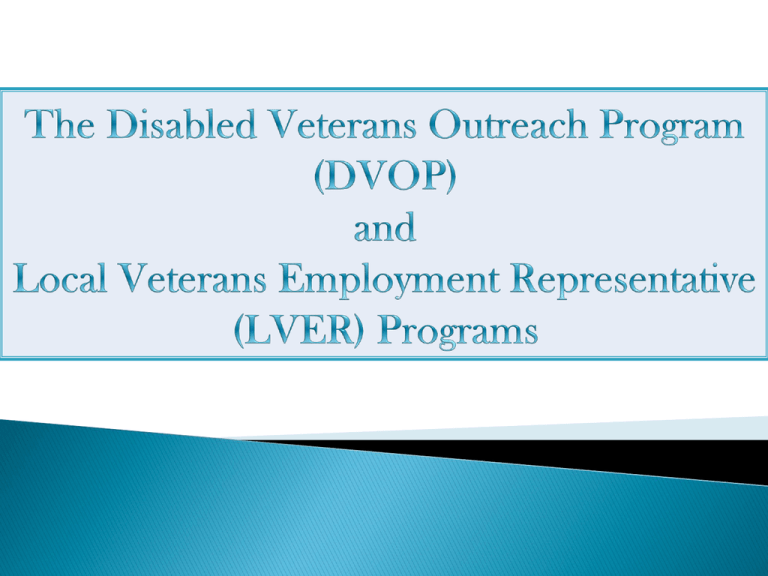
U. S. Department of Labor --- -- Organizational Chart Secretary of Labor Assistant Secretary for Veterans Employment and Training LVER/DVOP Program VWIP/HVRP/IVTP DOLEW FCJL USERRA Vet Preference RAVET DVET ADVET VPS/VPA American Job Centers LVER DVOP Funds provided to States will be based upon an approved plan that contains: A description of services to be provided The duties assigned to DVOPs and LVERs The manner in which DVOPs and LVERs are integrated in the employment service delivery system The veteran population to be served and Incentive performance plan Performance Goals for the One-Stop Delivery System For All Veterans and Disabled Veterans: • Veterans Entered Employment Rate • Veterans Employment Retention Rate • Veterans Average Earnings CONGRESS AND VETS Congress has questioned how JVSG differs from other DOL programs, especially Wagner-Peyser State Grants It is difficult to demonstrate the benefit of JVSG if the veterans served and services provided are similar to Wagner-Peyser DVOP/LVER Programs VPL 07-10 Preference for hiring: • Qualified service-connected disabled veterans • Qualified eligible veterans • Qualified eligible persons DVOP Program Section 4103A Full or part-time Intensive services Priority in servicing veterans A. Special disabled veterans B. Other disabled veterans C. Other eligible veterans Maximum emphasis on economically and educationally disadvantaged veterans DVOP Specialist Duties VPL 07-10 Consistent with WIA Section 134(d)(3)(C), the intensive services category now is clarified to include: o Comprehensive assessment of education, skills, and abilities; o In–depth interviewing and evaluation to identify employment barriers and appropriate employment goals; o Group and individual career coaching; o Short-term pre-vocational services that may include development of learning and communication skills, interviewing skills, personal maintenance skills, and professional conduct to prepare individuals for career goals; and o Development of an individual employment plan that identifies employment goals, interim objectives, and appropriate services that will enable the Veteran to meet his or her employment goals. DVOP VPL 07-10 Conduct outreach to locate veterans for intensive services such as: (a) VR&E (b) HVRP, IVTP and VWIP grantees (c) VA Medical centers and Vet Centers (d) Homeless Shelters (e) Civic and service organizations (f) Community Stand Downs (g) Military Installations (h) WIA partners (i) State Vocational Rehabilitation Services Case Management VPL 07-10 Case management is a service delivery strategy Case Management services are: o Conduct an assessment o Develop an employment plan o Follow-up IS can be delivered separately from CM (b) Principle Duties (1) Conduct outreach to employers in the area to assist veterans in gaining employment, including conducting seminars for employers and, in conjunction with employers, conducting job search workshops and establishing job search groups; (2) Facilitate employment, training and placement services furnished to veterans. (e) Manager’s Report LVER Duties/Employer Outreach VPL 07-10 LVER staff work with other service providers to promote the advantages of hiring Veterans to employers and employer groups. Together, they market job seeking Veterans as individuals who have highly marketable skills and experience. LVER Duties/Employer Outreach VPL 07-10 LVER staff serve as an advocate for Veterans with business, industry, and other community-based organizations by participating in a variety of outreach activities such as: o Planning and participation in job and career fairs; o Coordination with unions, apprenticeship programs, and business organizations to promote employment and training programs for Veterans; o Informing Federal Contractors of their responsibility to recruit qualified Veterans; and o Promoting credentialing and licensing opportunities for Veterans. LVER/DVOP Mandatory Training VPL 07-10 According to Title 38 USC, § 4102A, LVER and DVOP staff are required to receive specialized training provided by NVTI.. Those hired on or after October 13, 2010 have 18 months to complete their specialized training. SUMMARY OF DVOP and LVER Programs NEED FOR DISTINCTION SPECIALIZATION OF ROLES OTHER STAFF ALSO RESPONSIBLE FOR SERVICES TO VETERANS ‘Priority of service’ means, with respect to any qualified job training program, that a covered person shall be given priority over nonveterans for the receipt of employment, training, and placement services provided under that program. (Chapter 42, section 4215) 20 CFR 1010.20 Title 38 Chapter 42 Section 4215 20 CFR 1010.110 Priority of service for veterans in Department of Labor job training programs “Qualified job training program” is any workforce preparation, development, or delivery program or service that is directly funded, in whole or in part, by the Department of Labor. 20 DOL-Funded workforce programs are covered by section 4215: • WIA Adult and Dislocated Worker • Wagner-Peyser Employment Services • Trade Act Programs • National Emergency Grants • Senior Community Service Employment Program (SCSEP) • Migrant and Seasonal Farm Worker Program • Indian and Native American Program • Job Corps • WIA Demonstration Projects • Labor Market Information Grants • Career One-Stop Electronic Tools • Other Internet-based self-service tools operated by DOL programs Veteran [38 USC 101(2)] Active military service Discharged under “other than dishonorable” conditions (regulations) 20 CFR 1010.110 Eligibility derived from a living veteran • Service member is missing in action, captured or forcibly detained • Veteran has total service-connected disability, per VA evaluation Eligibility derived from a deceased veteran • Veteran died of a service-connected disability • Veteran dies while a total service-connected disability, per VA evaluation, was in existence 20 CFR 1010.110 Implementing processes to ensure covered persons are made aware of: Entitlement to priority of service Other employment, training and placement services available Eligibility requirements for those programs or services The right to take precedence over non-covered persons Depending on the type of service or resource being provided, taking precedence may mean: Covered person gains access to service or resource earlier than the non-covered persons Covered person receives service or resource instead of a non-covered person when resources are limited 20 CFR 1010.200 Joint monitoring of Priority of Service by: The Veterans’ Employment and Training Service (VETS) The DOL agency responsible for the program’s administration and oversight 20 CFR 1010.240

